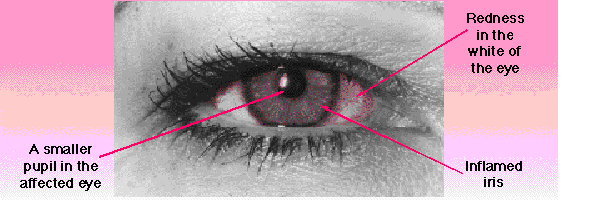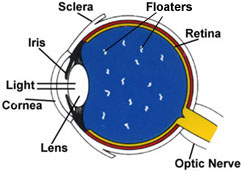Seeing Better with C
Vitamin C is required in all tissues of the body. Depending on their particular structure and function, different tissues respond to a lack of vitamin C in different ways. Arteries form plaques while veins don’t, due to the stresses of blood pressure associated with arteries. Our eyes deteriorate without adequate supplies of vitamin C. An indication of the importance of vitamin C to eyesight is the fact that the concentration of vitamin C in the vitreous humor (the clear liquid in the eyeball) is about twenty-five times our serum level (the level in our blood), the retina 100 times.
The antioxidant qualities of vitamin C help prevent crystallization and accumulation of foreign molecules that result in the blurred vision of cataracts.
As is so often the case, if a condition appears over long periods of time, look to nutritional deficiencies as contributing, if not the outright cause.
Macular Degeneration – An Hypothesis
For people that have been taking blood-thinning medication for years, I believe macular degeneration could be a complication of chronic vitamin C deficiency (collagen formation) exacerbated by the blood-thinning medication. If atherosclerosis is a healing process to prevent blood seepage through an already-compromised circulatory system, then these ocular arteries may not allow this buildup due to their already tiny size. If this is true, then they would be susceptible to seepage, which is just what causes most macular degeneration. Additional support for this theory is the test for vitamin C deficiency which tests “capillary fragility”, estimating the quantity of ascorbate required to maintain capillary integrity.
This would also be consistent with its (macular degeneration) appearance in people who have been taking blood-thinning medication over an extended period and have advanced atherosclerosis.
For more information on macular degeneration, please visit the Macular Degeneration page of Eyecare2020 and the Macular Degeneration page of the Schepens Eye Research Institute.
Macular Degeneration Slowed by Antioxidants
February 22, 2002
A just-completed five-year study shows that a combination of zinc and antioxidant supplements inhibits the progression of macular degeneration. An article detailing the study is available at Access Excellence.
Participants received either 80 milligrams of zinc oxide; an antioxidant combination including 500 milligrams of vitamin C; 400 IU of vitamin E; 15 milligrams of beta-carotene; the antioxidant combination plus zinc; or a placebo. The best results were seen (no pun intended) by the patients receiving the combination therapy. The combination of antioxidants plus zinc received reduced the risk of disease progression by 25% in people with intermediate macular degeneration or advanced disease in one eye.
These results are not shocking (please see my discussion of Macular Degeneration on the Eye Conditions page). The study also showed the therapy did not have a positive effect on cataract formation. I believe this is due entirely to the very low dose of vitamin C used. It is very discouraging that studies continue to use doses of vitamin C that are so very low, especially considering its safety. Even so, the evidence continues to mount that our bodies are able to keep us mostly free of chronic conditions when given an adequate supply the right raw materials.
Cataracts
Senile cataracts, the lens opacities that develop in older eyes can be prevented, or at least greatly decreased, by long-term vitamin C supplementation. Cataracts are caused when large protein molecules aggregate to the point where they are large enough to diffuse light and thus hinder vision. The liquid substance that fills our eyeballs, the aqueous humor has a high concentration of vitamin C-much higher than our blood levels. Studies have shown that cataractous eyes have a reduced vitamin C level. One study concluded that the low vitamin C level in these eyes was the cause, not the consequence, of cataracts. A study reported on October 20, 1997 from Tufts, reprinted here (additional study also), finds that cataract formation may be reduced by as much as 77% with long-term vitamin C supplementation. Widespread “conditions”, like cataracts, are often caused by nutritional problems.
Glaucoma
Glaucoma is a serious eye condition, that over time can result in blindness. Glaucoma’s symptom is increased intraocular pressure. The normal pressure in the eyeball is less than 20 millimeters of mercury. Mild cases (pressures of 22-30 mm Hg) can go unnoticed for years. More serious conditions may exhibit pressures as high as 70 mm Hg! Higher pressures cause swelling and pain and is a leading cause of blindness.
Vitamin C lowers the intraocular pressure. Dr. Michele Vireo and associates reported at the 1972 meeting of the Ophthalmologists Society, Italy their work with glaucoma patients and vitamin C. They gave daily oral doses of vitamin C corresponding to 0.5g per kilogram (2.2 lbs.) of body weight over a period of seven months. Their results showed a reduction of intraocular pressure of about 50% from initial values of 30 to 70 mm Hg. These low points were reached approximately 4 to 5 hours after the vitamin C dose and the effects lasted about eight hours. Some conclusions drawn by Professor G.B. Bietti based on this and additional work as reported in The Vitamin C Connection,
- In large doses, ascorbic acid is a very effective agent for reducing intraocular pressure when administered intravenously or orally.
- It has been demonstrated that the hypotonic (less degree of tension, ed.) action of ascorbic acid on the eye can be prolonged indefinitely, at least for the seven-month period observed here, by administration of 125mgs per kilogram of body weight three to five times a day.
- Normal intraocular tension was achieved with ascorbic acid alone or in association with topical medication (miotics). On some occasions, this happened when miotics by themselves were unable to control the tension.
Might optimum intake of vitamin C over long periods have prevented the intraocular pressure from ever increasing, at least in the chronic form of the disease? Since the cause of chronic glaucoma is so vague, as are so many nutritionally-related conditions, could glaucoma be the result of long-term sub-clinical scurvy? Sounds reasonable to me.
Iritis
Iritis is an inflammation of the iris, the protion of the eye that opens and closes to adjust the light level that passes into the eye. The light hole the iris creates is the pupil.

Picture from Iritis page of Apagrafix
Like so many problems, the conventional medical community has little to offer the people that suffer from this serious, painful and chronic condition. For more information and a sufferers bulletin board, please visit

After I sent out my newsletter about “-itis” diseases, I received an e-mail from a reader that has had success treating his iritis. This is not very surprising since vitamin C is the body’s chief mediator of inflammation.
Retinal and Vitreous Problems
The vitreous humor is the jelly-like liquid that fills the central cavity of the eye. Normally, it is of a very consistent thickness, or viscosity, and is crystal clear. Several eye conditions that occur that effect our vision have their root in changes to the vitreous (see Info on Retinal and Vitreous Problems and the Flashes and Floaters page by Retina Vitreous Associates (source of the eye drawing below).
Floaters and Flashes
Floaters are caused by inconsistencies in the viscosity of the vitreous or accumulations of debris (similar to cataracts in the lens) that distort or block the vision. Very often these floaters are not much more than a nuisance and also have a tendency to come and go. They can, however, become very disturbing and don’t go away.

These inconsistencies in the vitreous can also cause stress on the retina. The retina is attached to the vitreous like a label on a jar. If this junction is not perfectly consistent, stresses on the retina result. At first, a slight tugging excites the nerves of vision and the brain thinks it is seeing something; This is a “flash”. More stress can cause damage to the retina (see below).
The very high concentrations of vitamin C in the vitreous, lens and retina are there for a reason. The vitamin C protects these components of the eye and maintains the consistency and clarity of the lens and vitreous. Vitamin C may be the single most important nutrient for long-term eye health.
A visitor to Cforyourself shared this from Prevention magazine, Dec. 1974, p. 171: “For about 4 yrs I had considerable trouble with spots (floaters) behind my eyes. After seeing an optometrist I was told that they would probably always bother me so I more or less resigned myself to this annoying problem. Then about 4 months ago I decided to treat myself for a sinus headache with vitamin C. I took 2 grams every hour for about 16 hours. The headache disappeared overnight and I realized at the same time that the spots in my eyes had disappeared as well. I haven’t had a sign of them since.”
Obviously, anyone that has “floaters” or “flashes” should try taking mega-dose vitamin C (see How Much to Take).
Retinal Tears and Detachments
Most of the mechanical damage to the retina, the dense nerve-endings (rods and cones) that receive the light on the back surface of the eyeball, are due to changes in the vitreous that create stress on the retina. As we age (there’s that clue to nutrition), the vitreous becomes less a consistent mass and loses some of its viscosity. Small lines of more liquid vitreous form strands and can become “floaters”. They can also put stress on the retina (remember the retina is like a label on a jar, so if the jar is not perfect, the label will take the stress), pulling away from the retina either tearing it or pulling it away with it, a detachment.
Tears and detachments are serious stuff. Laser surgery to fix these problems has amazing results, but once again, if the vitreous is maintained in its proper state, most of this damage won’t happen in the first place. Vitamin C is required to maintain the vitreous. Just like cataracts of the lens, these vitreous problems can be generally avoided by proper C supplementation.
Do you have any experience with eyesight difficulties and vitamin C? Please share your experience with our readers.
